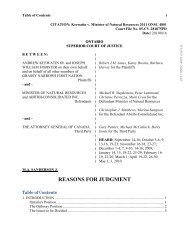Omers Energy Inc. v. Alberta (Energy Resources Conservation Board)
Omers Energy Inc. v. Alberta (Energy Resources Conservation Board)
Omers Energy Inc. v. Alberta (Energy Resources Conservation Board)
- No tags were found...
You also want an ePaper? Increase the reach of your titles
YUMPU automatically turns print PDFs into web optimized ePapers that Google loves.
Page: 20substances to produce. The issue assumed both the ability to produce when the tap was turned onand gas in the reservoir worthy of production.[86] The court in Bearspaw was also dealing with a habendum clause that employed the word“producible” rather than the usual “produced or producing”. The court noted the importance ofdifferences in lease language at paras 29-30 when distinguishing Freyberg , as well as the differencebetween a well that is shut-in at the lessee’s choice:Freyberg involved the interpretation of a habendum clause which provided that theterm of the lease depended upon the leased substances being “produced” ratherthan “producible”. The case also arose from different facts, including a well thatwas tied into a pipeline but “shut-in”, and lessors who had chosen not to produceand market the gas by “shutting off” the well.We do not interpret Freyberg as suggesting that a lease cannot define its term onthe basis of anything short of immediate and continual production, but rather thateach lease must be interpreted strictly on its own terms. The policy concernsoutlined in Freyberg do not preclude parties to a lease from choosing its durationon a basis other than that of immediate production, which is what occurred herethrough the use of the word “producible” rather than “produced”.[87] If anything, the finding in Bearspaw that the wells were ready and able to produce when thetap was turned on supports the <strong>Board</strong>’s finding that a well must be capable of producing in itsexisting configuration without requiring further operations that continue a lease.[88] It follows that <strong>Omers</strong> must lose this appeal unless the minimal amount of gas that flowedfrom the tap here, described by Montane as a “puff” of gas, constitutes, in itself, production. Thismeans asking whether “capable of producing the leased substances” requires a particular volumeof gas. What did the parties intend by the term “producing”?[89] The <strong>Board</strong> found there must be a meaningful quantity of gas to satisfy the phrase “producingthe leased substances”. It stated at 9 of its decision:[T]here must be at least some material, as in a meaningful, volume of productionpossible for the lessee to rely on the suspended well clause to extend the lease. Aninterpretation that would permit a very low or even nonexistent threshold wouldprovide little or no incentive for a lessee to undertake operations to enhance therecovery of leased substances. It would also result in only a nominal return to thelessor for an indeterminate length of time without any obligation on the lessee torectify the situation. Such an interpretation is, in the <strong>Board</strong>’s view, contrary to theintention of the parties as expressed throughout the lease as a whole.[90] Summing up the interpretation of the phrase “capable of producing the leased substances”in the Suspended Wells Clause, the <strong>Board</strong> stated that the phrase:
















